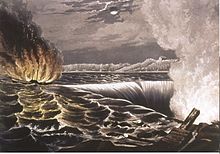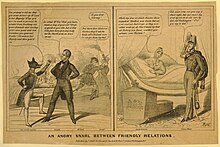
Back Caroline/McLeod-Affäre German رویداد کارولین Persian Affaire du Caroline French פרשיית הספינה קרוליין HE Caso Caroline Italian キャロライン事件 Japanese


The Caroline affair (also known as the Caroline case) was an international incident involving the United States, the United Kingdom, and the Canadas which started in 1837 and lasted until 1842. While ultimately a minor historical event, it eventually acquired substantial international legal significance.[1][2]
The affair began on December 28, 1837, when hundreds of Americans who had been recruited by Upper Canada Rebellion leader William Lyon Mackenzie encamped on Navy Island on the Canadian side of the Niagara River. They had been brought there by the small American steamer Caroline, which had made several trips that day between Navy Island and Schlosser, New York. Late that night, a British force crossed the Niagara River to board and capture the vessel where it was moored at Schlosser's Landing in U.S. territory. Shots were exchanged and an American watchmaker was killed, before the force set fire to Caroline and set it adrift in the Niagara River, about two miles (3.2 km) above Niagara Falls. Sensationalized accounts of the affair were published by newspapers.[3]
The burning was praised in Canada and condemned in the United States. In retaliation, a group of thirteen Americans destroyed a British steamer in American waters, and U.S. citizens demanded their government declare war on Britain. The diplomatic crisis was defused during the negotiations of several US–UK disputes that led to the Webster-Ashburton Treaty in 1842. In the course of these negotiations, both the United States and Britain made concessions concerning their conduct. The incident was used to establish the principle of "anticipatory self-defense" in international relations, which holds that it may be justified only in cases in which the "necessity of that self-defense is instant, overwhelming, and leaving no choice of means, and no moment for deliberation". This formulation is part of the Caroline test.[4]
- ^ Waxman, Matthew C. (August 28, 2018). "The Firebrand: William Lyon Mackenzie and the Rebellion in Upper Canada". The Lawfare Blog. Retrieved October 23, 2022.
- ^ Jennings, R. Y. (1938). "The Caroline and McLeod Cases". American Journal of International Law. 32 (1): 82–99. doi:10.2307/2190632. ISSN 0002-9300. JSTOR 2190632.
- ^ Moore, John Bassett (1906). A Digest of International Law. Vol. 2. United States Government Printing Office. pp. 25, 409 & 410. Retrieved November 11, 2009.
- ^ Greenwood, Christopher (April 2011). "Self-Defence". In Peters, Anne; Wolfrum, Rüdiger (eds.). Max Planck Encyclopedia of Public International Law. Max Planck Institute for Comparative Public Law and International Law – via Oxford University Press.
© MMXXIII Rich X Search. We shall prevail. All rights reserved. Rich X Search